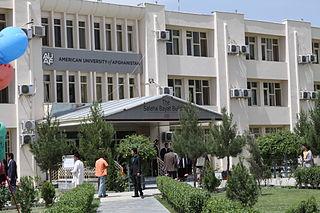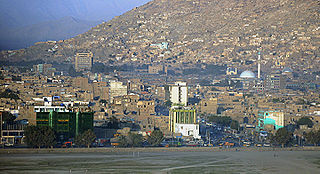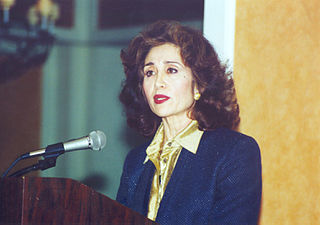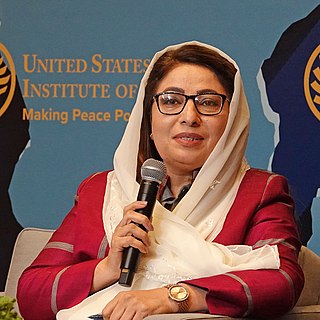Related Research Articles

The Revolutionary Association of the Women of Afghanistan (RAWA) is a women's organization based in Kabul, Afghanistan, that promotes women's rights and secular democracy. It was founded in 1977 by Meena Keshwar Kamal, an Afghan student activist who was assassinated in February 1987 for her political activities. The group, which supports non-violent strategies, had its initial office in Kabul, Afghanistan, but then moved to Pakistan in the early 1980s.

The Taliban, which also refers to itself by its state name, the Islamic Emirate of Afghanistan, is an Afghan militant movement with an ideology comprising elements of Pashtun nationalism and the Deobandi current of Islamic fundamentalism. It ruled approximately three-quarters of the country from 1996 to 2001, before being overthrown following the American invasion. It recaptured Kabul on 15 August 2021 following the departure of most coalition forces, after nearly 20 years of insurgency, and currently controls all of the country. Its government is not recognized by any country. The Taliban government has been internationally condemned for restricting human rights in Afghanistan, including the right of women and girls to work and to have an education.

The treatment of women by the Taliban refers to actions and policies by various Taliban regimes which are either specific or highly commented upon, mostly due to discrimination, since they first took control in 1996. During their first rule of Afghanistan (1996–2001), the Taliban were notorious internationally for their misogyny and violence against women. In 1996, women were mandated to wear the burqa at all times in public. In a systematic segregation sometimes referred to as gender apartheid, women were not allowed to work, nor were they allowed to be educated after the age of eight. Women seeking an education were forced to attend underground schools, where they and their teachers risked execution if caught. They were not allowed to be treated by male doctors unless accompanied by a male chaperone, which led to illnesses remaining untreated. They faced public flogging and execution for violations of the Taliban's laws.

The Access for Afghan Women Act of 2003 is a bill introduced in the United States House of Representatives by Representatives Carolyn Maloney and Dana Rohrabacher. The bill was submitted on March 27, 2003, to the House of Representatives and was immediately referred to the House Committee on International Relations.

Dr. Massouda Jalal is the first woman in the history of Afghanistan who ran for the Office of the President of Afghanistan in 2002, 2004, and again in 2019. Dr. Jalal emerged as a leading voice of Afghan women after her election as the Representative to the 2002 Loya Jirga as she became one of the frontrunners for the position of Interim President of Afghanistan, opposite to ex-president Hamid Karzai.
Danish Committee for Aid to Afghan Refugees (DACAAR)(Danish: Den danske komité for hjælp til afghanske flygtninge) is a non-political, non-governmental, non-profit humanitarian and development organization working to improve the lives of the Afghan people since 1984.

The Northern Alliance, officially known as the United Islamic National Front for the Salvation of Afghanistan, was a military alliance of groups that operated between early 1992 and 2001 following the dissolution of the Soviet Union. At that time, many non-Pashtun Northerners originally with the Republic of Afghanistan led by Mohammad Najibullah became disaffected with Pashtun Khalqist Afghan Army officers holding control over non-Pashtun militias in the North. Defectors such as Rashid Dostum and Abdul Momim allied with Ahmad Shah Massoud and Ali Mazari forming the Northern Alliance. The alliance's capture of Mazar-i-Sharif and more importantly the supplies kept there crippled the Afghan military and began the end of Najibullah's government. Following the collapse of Najibullah's government the Alliance would fall with a Second Civil War breaking out however following the Islamic Emirate of Afghanistan's (Taliban) takeover of Kabul, The United Front was reassembled.

Lesbian, gay, bisexual, and transgender (LGBT) people in the Islamic Emirate of Afghanistan face severe challenges not experienced by non-LGBT residents. Afghan members of the LGBT community are forced to keep their gender identity and sexual orientation secret, in fear of violence and the death penalty. The religious nature of the country has limited any opportunity for public discussion, with any mention of homosexuality and related terms deemed taboo.

Education in Afghanistan includes K–12 and higher education, which is under the Ministry of Education and Ministry of Higher Education. In 2021, there were nearly 10 million students and 220,000 teachers in Afghanistan. The nation still requires more schools and teachers. Soon after the Taliban take took the country in August 2021, they banned girls from secondary education. Some provinces still allow secondary education for girls despite the ban. In December 2022, the Taliban government also prohibited university education for females in Afghanistan, sparking protests and international condemnation. In December 2023, investigations were being held by the United Nations into the claim that Afghan girls of all ages were allowed to study at religious schools.
Human rights in Afghanistan are severely restricted, especially since Taliban's takeover of Kabul in August 2021. Women's rights and freedom are severely restricted as they are banned from most public spaces and employment. Afghanistan is the only country in the world to ban education for women over the age of eleven. Taliban's policies towards women are usually termed as gender apartheid. Minority groups such as Hazaras face persecution and eviction from their lands. Authorities have used physical violence, raids, arbitrary arrests and detention, torture, enforced disappearances of activists and political opponents.
Jalrez is a district in the west of Maidan Shar, Maidan Wardak Province, Afghanistan. The main town lies at Jalrez, which is 62.9 kilometres (39.1 mi) southwest of the centre of Kabul via the main Kabul-Behsud Highway. The district is a major producer of potatoes.

Women's rights in Afghanistan have oscillated back and forth depending on the time period as well as the regime in power. After King Amanullah Khan's attempts to modernize the country in the 1920s, women officially gained equality under the 1964 Constitution. However, these rights were taken away in the 1990s through different temporary rulers such as the mujahideen and the Taliban during the Afghan civil war. During the first Taliban regime (1996–2001), women had very little to no freedom, specifically in terms of civil liberties. When the Taliban was overthrown by the United States following the 9/11 attacks, women's rights gradually improved under the presidential Islamic Republic of Afghanistan. Women were de jure equal to men under the 2004 Constitution.

Shia Islam in Afghanistan is practiced by a significant minority of the population. According to a PEW 2021 survey, 7% of Afghans followed Shia Islam, but other estimates have put the number as high as 35%. Afghanistan's Shia are primarily the Twelvers, while a minority are Ismailis.

United Nations Security Council resolution 1378, adopted unanimously on 14 November 2001, after reaffirming all resolutions on the situation in Afghanistan, including resolutions 1267 (1999), 1333 (2000) and 1363 (2001), the Council affirmed that the United Nations would play an important role in the country and called for the establishment of a transitional administration leading to the formation of a new government.
2003 in Afghanistan. A list of notable incidents in Afghanistan during 2003
The Secretary's Office of Global Women's Issues is located within the United States Department of State. In 2009, Melanne Verveer was appointed to be the first Ambassador-at-Large for Global Women's Issues. From September 2013 to May, 2017, Catherine M. Russell was appointed to this position. From May 2017 through December 2019, there was no ambassador for this office. Kelley Currie, a political appointee, joined the Global Women's Issues Office as U.S. Ambassador-at-Large in January 2020. Geeta Rao Gupta is the current Ambassador-at-Large for the office as of May 18, 2023.

Sima Wali was one of the foremost Afghan human rights advocates in the world, serving as an international campaigner for the liberties and empowerment of refugee and internally displaced populations. She was the Chief Executive Officer of Refugee Women in Development (RefWID), Inc., a global non-profit organization that advocated for the civil rights of refugee women and girls fleeing from conflict and for their equitable reintegration into their societies. She was also the vice president of the Sisterhood Is Global Institute, the world’s first feminist think tank.

Adela Raz is an Afghan politician who served as the last ambassador of the Islamic Republic of Afghanistan to the United States from July 2021 to February 2022. Raz was also the first woman to hold the office of Permanent Representative of Afghanistan to the United Nations.

Asila Wardak is an Afghan human rights activist, women's activist, former diplomat, and the first Afghan woman elected as a member to the Organization of the Islamic Cooperation's Independent Human Rights Commission. Wardak is one of the co-founder of the Afghan Women's Network. She served as Minister Counselor at the Afghanistan Mission to the United Nations. She also worked as the head of the human rights issue for Afghanistan's Ministry of Foreign Affairs.

#StopHazaraGenocide is a social media campaign that aims to raise awareness and demand action against the persecution and violence faced by the Hazara ethnic group. The campaign was initiated by Hazaras in response to a series of deadly attacks on the Hazara community, especially students and women, by the Taliban and other extremist groups.
References
- 1 2 3 4 5 6 7 8 9 10 11 "Our Profile". Afghanistan Women Council.[ non-primary source needed ]
- 1 2 Tétreault, Mary Ann (1994). Women and Revolution in Africa, Asia, and the New World. Univ of South Carolina Press. p. 227. ISBN 978-1-57003-016-1.
- ↑ Ahmed-ghosh, Huma (March 2006). "Voices of Afghan women: Human rights and economic development". International Feminist Journal of Politics. 8 (1): 110–128. doi:10.1080/14616740500415508. S2CID 144587310.
- ↑ Samar, Sima (22 March 2019). "Feminism, Peace, and Afghanistan". Journal of International Affairs. 72 (2): 145–159. Gale A601553281 ProQuest 2297100368.
- ↑ "Database".
- ↑ "Afghan Women Council calls for united Afghanistan". BBC Monitoring Central Asia. 2 February 2002. ProQuest 450571027.
- ↑ Manganaro, Lynne L.; Alozie, Nicholas O. (April 2011). "Gender Role Attitudes: Who Supports Expanded Rights for Women in Afghanistan?". Sex Roles. 64 (7–8): 516–529. doi:10.1007/s11199-011-9931-6. S2CID 145672330.
- ↑ Fleschenberg, Andrea (2019). "Afghanistan: Uphill Challenges for Women's Political Rights". The Palgrave Handbook of Women's Political Rights. pp. 185–199. doi:10.1057/978-1-137-59074-9_13. ISBN 978-1-137-59073-2. S2CID 158267643.
- ↑ ""Woman Can't be a Minister... They Should Give Birth": Taliban".
- ↑ "Taliban's treatment of women is crime against humanity, says Gordon Brown".
- ↑ https://www.amnesty.org.uk/files/2023-05/TALIBAN%20WAR%20ON%20WOMEN_ICJ%20AI%20Afghanistan%20Report_Final_0.pdf?VersionId=kg7a.wDtZsI0oXKtdCMAemddQCilLNSq%5B%5D%5B%5D
- ↑ "Afghanistan: The Rule of Taliban: A year of violence, impunity and false promises".
- 1 2 "Engagement key to reform of Taliban decrees restricting women's rights". UN News. 26 September 2023.
- ↑ "Speech: The women's rights crisis: Listen to, invest in, include, and support Afghan women". UN Women – Headquarters. 2023-09-26. Retrieved 2023-11-28.
- ↑ https://www.dni.gov/files/ODNI/documents/assessments/SOCM-AFG_Women.pdf